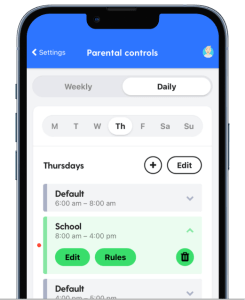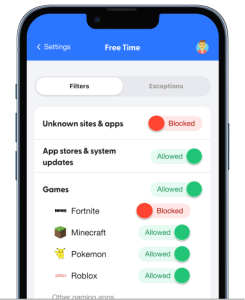It’s common for parents to feel guilty for not spending enough time with their children. To keep their children entertained and away from boredom, parents often give in to their child’s insistence to watch more television. But research suggests that boredom may be highly beneficial for children.
Researchers say that boredom can help kids with their imagination and creativity. Most children will find ways to entertain themselves to keep occupied. This is a vital skill since as they grow older, they learn to adapt to various situations by planning, organizing, and having a problem-solving attitude towards life.
Today, many children use mobile phones, laptops, and tablets for educational purposes or to keep them busy so that parents can have some time off. This level of screen time has never been accepted before. But can it be tolerated?
According to The American Academy of Pediatrics:
- There should be no digital media use (except video-chatting) in children younger than 18 to 24 months.
- For children 18 months to 5 years, the AAP now recommends aiming for not more than one hour of screen entertainment per day and focusing on educational media. This is a cumulative period and should be divided throughout the day.
How Harmful is Unlimited Screen Time?
A child who spends hours and hours on the screen can suffer irreversible and long-term effects on both his or her mental and physical development. Therefore, parents must be cautious and have complete control over the use of the screen by their children.
Some of the vicious effects are:
1. Obesity:
Sitting in front of a screen and lack of outdoor activities can lead to a sedentary lifestyle in children, resulting in obesity.
2. Poor sleep quality:
Increased screen usage close to bedtime (30 minutes to 1 hour) can cause poor sleep quality.
This is believed to be due to the blue light emitting from the digital screen that suppresses the production of melatonin. Melatonin is a natural hormone that is required to relax the body for sleep.
Sleep is very important for mental as well as physical growth in children, therefore poor sleep quality leads to poor overall growth.
3. Myopia or near-sightedness:
Studies have shown that increased near work for a long period can affect the eye muscles and cause short-sightedness.
It’s not just screens that affect eye development in children. It’s also traditional books and the amount of time spent indoors overall.
Some studies also found that spending time outdoors—especially in early childhood—can slow the progression of near-sightedness.
4. Digital Eye Strain:
The easiest way to avoid digital eye strain is to follow the 20-20-20 rule.
What is the 20-20-20 rule?
- After every 20 minutes of looking at a digital screen, look at something 20 feet away, for 20 seconds.
- Use lubricating drops
- Consult your doctor in case of persisting symptoms such as headache, blurred vision, redness, watering, etc.
5. Unhealthy expectations:
Children of impressionable age can be affected by the growing influence of social media, which can result in unrealistic beauty standards, leading to body dysmorphic disorder, bulimia, etc.
6. Inappropriate content:
A study showed that teenagers are the highest Internet assessors, and pornographic addiction is a serious concern for them.
Prevention and intervention programs, along with strategic plans, are necessary to address these problems.
7. Development of harmful tendencies:
Children’s screen time without supervised monitoring can lead to psychiatric health issues.
A 2014 Wisconsin crime by two 12-year-old girls is one such example.
They lured their friend into a forest and nearly killed her by stabbing her 19 times. The girls said they believed that Slender Man, a popular horror meme, was real and by killing their friend, they would become his “proxies.”
The “Blue Whale challenge” in 2016 was compiled of 50 tasks over 50 days. These tasks included dangerous stunts and self-harm. The final challenge was committing suicide, therefore this challenge was reported to be an online “suicide game” aimed at teenagers. This game was alleged to be linked to numerous deaths all around the world.
“Let’s go invent tomorrow instead of worrying about what happened yesterday.” – Steve Jobs
Nonetheless, technology can be incredibly useful.
We can video chat with someone sitting thousands of miles away, we can order food from our favorite restaurant that’s delivered straight to our door, and we can learn new skills for free and become more productive. We can even enroll in an online course and earn a degree.
The use of artificial intelligence has enabled us to do financial transactions without visiting the bank, saving us time and effort.
Healthcare has been significantly improved thanks to the development of software, surgical equipment, robotics, and even genetic testing.
Technology has the potential to make or break life.
Use it to make your child thrive.
TOOL TO EVALUATE SCREEN TIME IN CHILDREN
As a parent, you can assist your child by being present during the time they are using the device.
Explain what the content is about and make sure that it is educational and not just for entertainment.
If you can’t be present with them, encourage them to use the device responsibly.
You can manage their screen time and set device screen time limits by using a feature of digital well-being and parental control on your Android device.
The same can be done on your Apple devices by going to the settings and turning on the screen time.
Keep your device child safe. Above all, talk to your child and make them understand the dangers of sharing their location, and private information on social media or with people they don’t know.
Tell them to close immediately and inform you if any pop-up window comes with any strange content.
Let’s take the responsibility to guide our children for a brighter and better future by being thoughtful about what they are learning and being exposed to.






